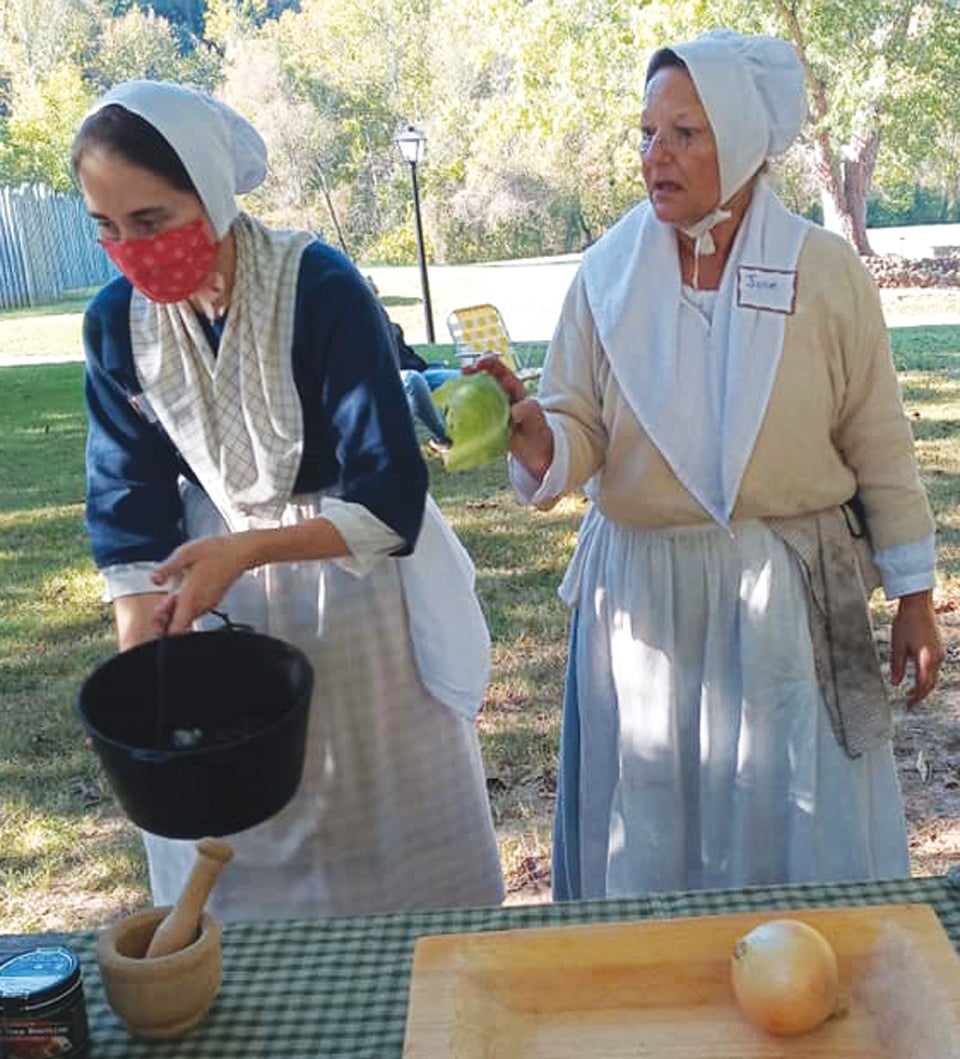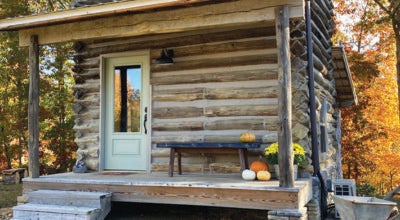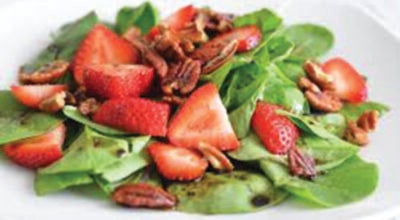Bless Your Spoon: Back country cooking over open flames at Bethabara
Published 7:06 pm Tuesday, November 2, 2021
|
Getting your Trinity Audio player ready...
|
Having worked at state historic sites – June Jones has an interest in history. But it’s not every day you land a job that allows you to live it out.
Recently, June conducted a back country cooking workshop with live demonstrations – an event hosted by Bethabara Park in Winston Salem. Back country refers to a time before the Revolutionary War when most of the 13 colonies were still owned by England.
After moving from Gastonia in December of 2019 to be with family who lives locally, June answered an ad in search of a guide for Bethabara Park. Already familiar with Old Salem and Moravian history – June applied for the position.
The executive director there, Frank Brown, later introduced his idea of holding live cooking demonstrations after receiving requests for workshops.
While working at Historic Stagville, a state historic site in Durham, June honed her outdoor cooking skills. They needed someone to do it – so she learned.Wanting to demonstrate what folks in the 1850s would have eaten, June’s job was to figure that out – and how to cook over an open flame.
She came to Bethabara with the know-how. “I came from a camping background so cooking over an open fire was not new to me.”
June’s cooking demonstration depicted a period around 1760 – a time still rustic. Recipes used were period and German in origin. More than likely, recipes came from Moravians because there wasn’t much variety back then. The Moravians took basic German cooking practices and recipes – then adjusted and revised them according to what was available at that time in North Carolina.
While working for the historical site in Durham, June had conducted much research on recipes from the 1850s time frame. For her new assignment, she needed to perform additional research – she’d need to search further back to determine what and how food was cooked in the 1760 time period. She discovered many recorded instructions. However, finding recipes that could be prepared on an open fire and in the time frame allowed was a challenge.
Because of German descent, immigrants prepared foods similar to what they remembered eating growing up – lots of sweets mixed with salty, strong flavors, sauerkraut and sausages paired with apples, or salty foods paired with sweet. June explored flavors that would have been used by the immigrants – and Moravians were part of that group.
Cast iron and some tin were primary cooking utensils. A pottery saucepan on legs would have been placed close to the fire and used to prepare a slowly simmering sauce. While demonstrating, June shares how cooking temperatures are changed by using different length hooks. The longer the hook, the closer the pot was to the fire – and hotter the temperature.
Part of cooking was keeping the fire going at a steady flame. Back in those days, a fire burned 24 hours a day and was banked at night – the coals pulled up into the center. The fire would burn all night. In the morning, they’d get some more kindling and get it started again.
June’s challenge is trying to keep the demonstrations historically accurate. Back then, there was no plastic and no paper – nothing like modern-day cooking. For instance, when demonstrating, June doesn’t use any containers – milk has to be put in pitchers, vinegar has to be in a jug – everything has to be in a proper container.
Preparing meals promptly was not a priority for cooks of the 18th century because they cooked all day. After cleaning up one meal, they began to work on the next – and when that was cleaned up, they prepared the next, and so on.
“Cooking was full time from the time you got up – and until you went to bed, you were preparing food,” June said.
Back then, people cooked communally – everybody took a turn. When the Moravians first arrived – there was much work but not enough people. They had few cooks, and there were other chores to complete. The settlers were living in woods – and the work was very intense. They would rotate who was responsible for the cooking. Later, families began to cook.
The preservation of food was time-consuming. Just to make sauerkraut – it would take two weeks before it was edible. The process of preparing meat was 6-8 weeks to make and smoke sausages so they could be preserved. There was no canning – and vegetables were either kept in a cellar or dried. Pumpkin was grated and dried. When ready to use, the fruit had to be reconstituted – the water put back in. Dried food would keep a good portion of the winter. People had to eat what was available, which was anything that could be preserved.
If you consider that from about December to April, there wasn’t much else to harvest – one had to prepare food that would be available in the future. Potatoes could be in the cellar – root vegetables would last for weeks that way. Green beans were dried and later added to soups and stews, adding more nutrients to their diet.
Recognizing how difficult it was to save food, June noted, “It makes me very grateful for a grocery store.”
By the 1800s, folks already had more ways to preserve foods. But back in the 18th century, it was pretty rustic. Imagine living with no faucet and no drain – and having to walk to a well to get any water.
Interesting to note is that recipes back then were not specific and much more general. Individual cooks used available food and personal expertise to prepare recipes. Everybody cooked differently because of that.
Many of the old recipes call for “a spoon.” A spoonful might depend on what spoon was being used. That’s the way recipes were recorded – because, for so long, recipes were not recorded at all. Today, we are specific about what goes into a dish. We still see this remnant phrase of the past – “according to taste” in modern-day recipes.
Bethabara was founded in 1753 by German-speaking Moravians. As the first European settlement in the NC Piedmont, Bethabara is a National Historic Landmark and Local Historic District. Today, Bethabara Park is 183 acres of protected wetlands, preserved wildlife, walking and birding trails, and historic buildings and grounds.
The historic site will be open Friday after Thanksgiving with living history demonstrations – there will be a potter, woodworker, and June will offer period cooking demonstrations.
“I love to watch people learn about history. You learn the best by doing. Anytime you can have someone doing something historically, in the historical fashion, they get a much better grasp of the time period,” concluded June.
Bethabara Park closes around the end of December and opens again around the end of March.
Still residing in Winston-Salem, June now lives with her sister who has taken on the role of cooking.
“I don’t cook now because that’s her job. But I know how to cook very well, and my children will attest to that.”
Just to make sure June doesn’t lose her back-country cooking skills, I hope to see her again stoking the coals of a fire.
SAUSAGES (18th Century)
6 lbs. lean pork
2 lbs. fat pork
4 Tbsp. salt
6 tbsp. finely chopped sage
5 Tbsp. freshly ground black pepper
2 Tbsp. cloves
Sprigs of rosemary
Mince lean pork and fat pork. Mix and add salt, sage, black pepper, cloves, and a little rosemary. Unless the meat is to be stuffed in intestines, keep it in a tightly sealed jar. When needed, roll it in balls, dust it with flour, and fry.
GOOD CABBAGE SALAD (18th Century)
1 head of white cabbage
1 gill or ½ water glass good fruit vinegar
2/4 lb. butter
All-purpose flour
Salt
Red pepper
3 beaten eggs
Wash a nice, fresh head of white cabbage and cut out the heart. Shred fine on a cabbage plane, put in deep porcelain bowl, and pour the following mixture over it. Take 1 gill or ½ water glass of good fruit vinegar, 2/4 pound of butter cut into 4 pieces and rolled in flour, 1 small salt spoon of salt, and about as much red pepper. Mix this well. and let it come to a boil in a saucepan. Beat the yokes of 3 eggs, and as soon as the above mixture begins to boil, take it from the fire and stir in the beaten eggs. Then pour all of this hot over the shredded cabbage and mix it thoroughly with a spoon.
POTATOES WITH MUSTARD (18th Century)
2 ½ lb. potatoes
2 rutabaga
2 white onions
Butter
2 Tbsp. ground mustard
Chopped parsley
Wash and peel potatoes. Cut into round slices, but not too then. Rinse in fresh water. Chop rutabaga and onion and set aside. Set potatoes in water over fire and let cook until soft, but not until they begin to fall apart. Drain off water. Melt some butter in a shallow pan, pour the potatoes in, and let simmer a little in butter. Stir in two spoonfuls of mustard, just enough hot meat broth to equal, but not cover the potatoes. Season with salt. If this makes too much liquid, bring to a boil and reduce. Pour potatoes and mustard into a deep serving dish. In a saucepan, saute chopped rutabaga and onion in butter for a few minutes but not over a hot fire. Pour this evenly over potatoes and serve.
JOHNNY CAKE (18th Century)
1 pint of whole milk
3 pints Indian meal
½ pint all-purpose flour
Variations included using water, instead of milk, adding salt, molasses, or shortening. Pumpkin, potato, or other starch was used if flour or Indian meal was in short supply. The batter would be fried in a pan or cooked on a griddle, or made stiff and baked before the fire on a bannock board. Sometimes the batter was placed directly into hot ashes to bake and then washed off before being eaten.
COOKED VEGETABLES (18th Century)
Fresh vegetables must be cooked until completely, through and through, soft. Clean them thoroughly to rid them of insects. Boil quickly in a good quantity of water and if boiling continues uninterrupted, they should be ready as soon as they sink to the bottom of the pot.
MUSTARD (18th Century)
When you want good mustard for the table, take a spoonful or two of this flour (ground mustard seed) and as much boiling liquor from the pot, where beef or pork is boiled, as will make it of the consistence you desire. For want of such liquor, boil a little salt and water together and mix your mustard flour with that.
POWDERED BEEFE (18th Century)
Take meat liquor from the pot and boil down. Allow to dry. Break in lumps or grind to powder. This will give you pocket soup easily carried.
MODERN QUICK CABBAGE SALAD
Water
Apple vinegar
1 tsp. salt
Mustard seed, whole cloves, herbs
Pickling – Equal parts of water and enough apple vinegar to cover cabbage, and 1 tsp. salt. Bring to a boil. Can add mustard seed, whole cloves, or other herbs to taste. Rinse cabbage and remove outside leaves. Shred cabbage fine and place in a non-metal bowl. Pour hot pickling over cabbage and let sit. The longer the dish is allowed to sit, the stronger the flavor.
MODERN JOHNNY CAKES
1 part whole milk
3 parts cornmeal
1 part all-purpose flour
Mix and fry in butter over the fire.






